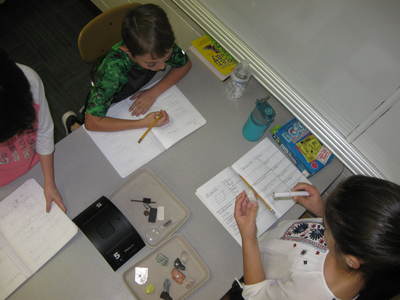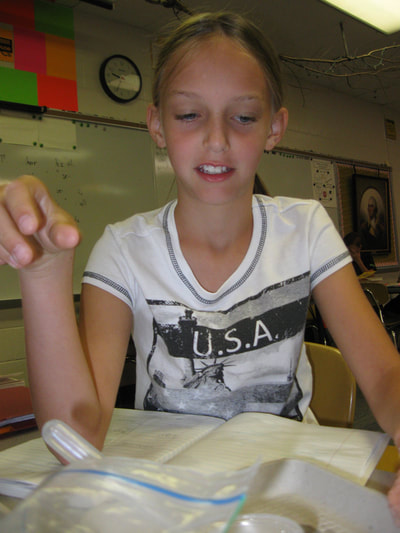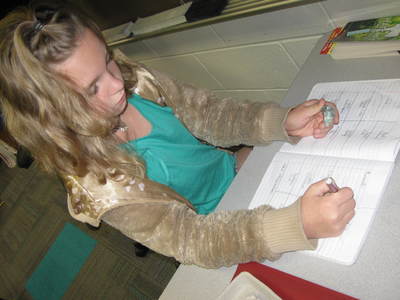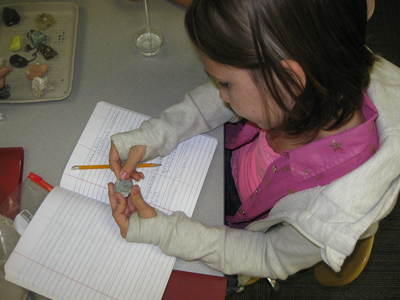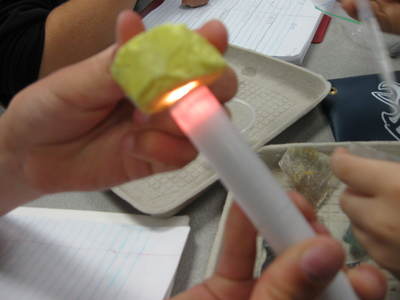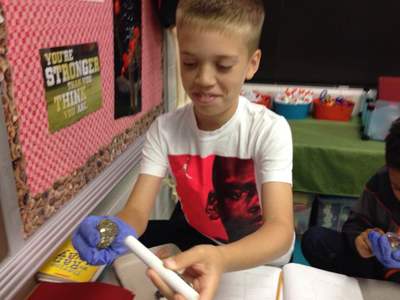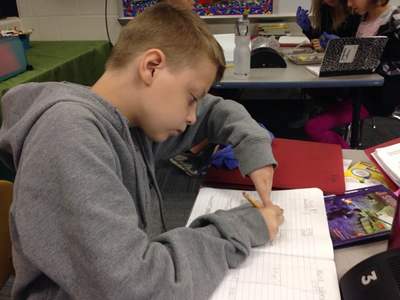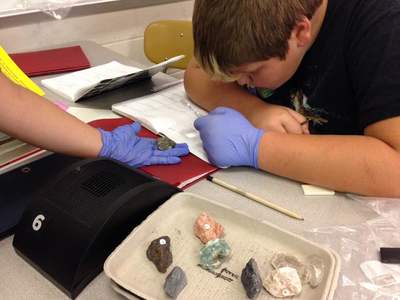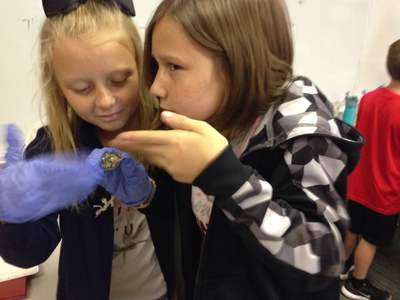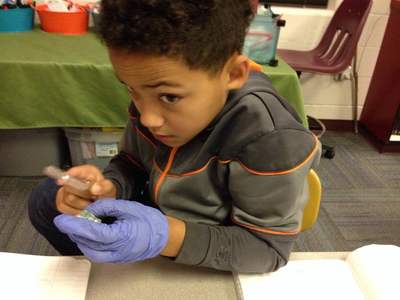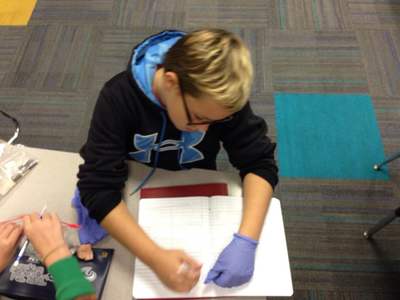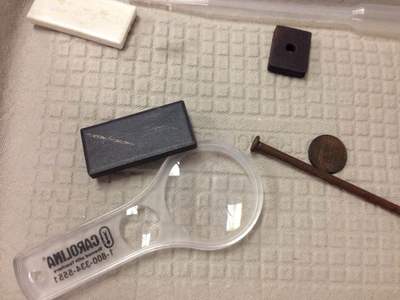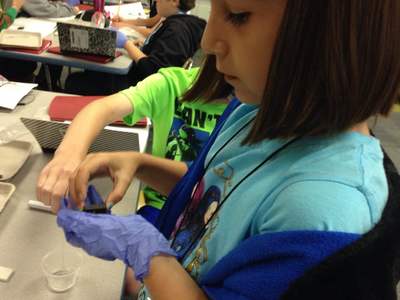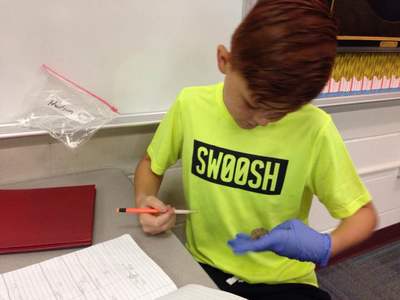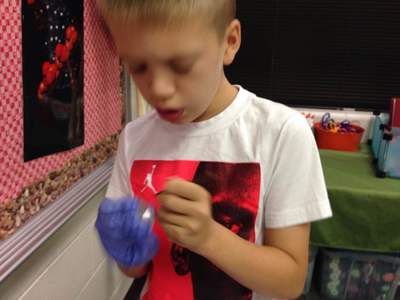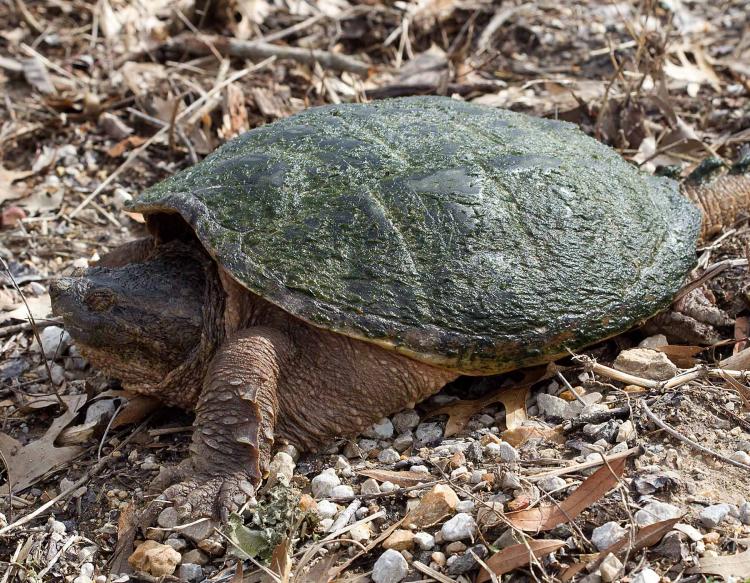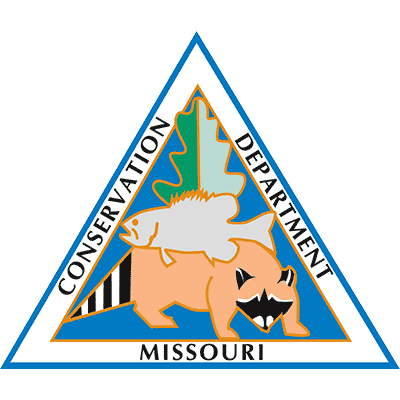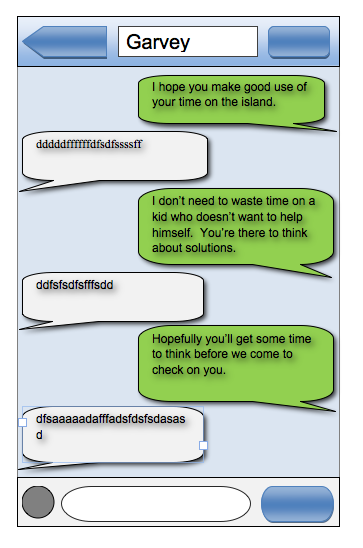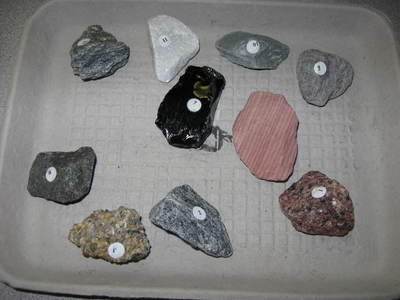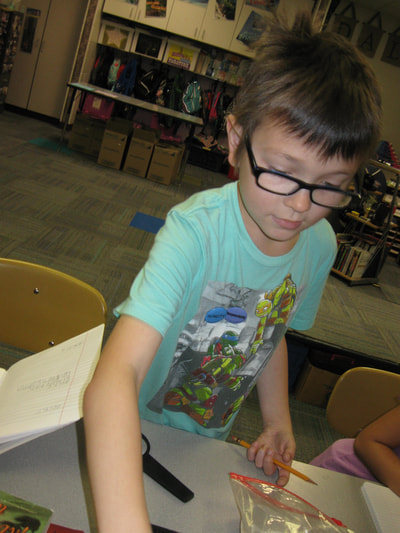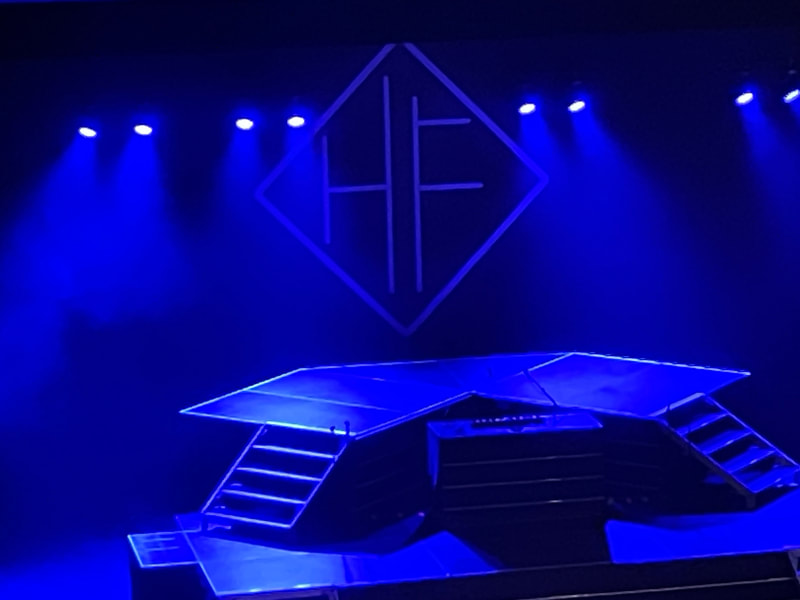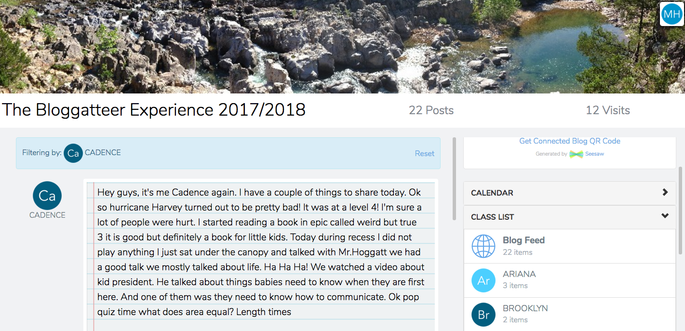|
In our continued efforts to pursue the workings of our earth, we resumed our mineral investigations for a second day. Students are not only learning about our geological treasures; they are also discovering ways to interact with their peers more appropriately and respectfully.
Our geologists took to the lab to investigate, test, and describe, look, feel, smell, streak color, luster, light, magnetism, hardness, cleavage, and other observations for a set of twelve minerals.
Today is September 11, the anniversary of the tragic terror attacks on our country in 2001. Every year, we recount the day as, now, it has become a part of history and something our newest students do not remember. It's not often our classes can hear about history from people who experienced it, but 9/11 is something the teachers know about, something we experienced for ourselves. We were not in New York, Washington, and Pennsylvania, but we were fully tune in to the events of the day. We were fully aware of the implications the attacks would have on our own lives, our classrooms, and our nation. We remember the emotions of fear and confusion, and we remember the numbness we felt as we brought our students into our classrooms after visiting Music and Physical Education. The rooms we reentered no longer felt the same. We now lived in a new and different world...and we didn't think we were going to enjoy it one bit. Today, we want to break down some of the details of what happened that morning. We guard our precious students, not wanting to scare them, but to relate our experiences in a time that changed the world. It's a part of history from which we want to learn...and not repeat.
We have stumbled upon the anniversary of the birth of one of Missouri's educational pioneer, William Torrey Harris. William Torrey Harris was a philosopher and educator. He cofounded the St. Louis Philosophical Society and is considered one of Missouri’s most influential intellectuals during the nineteenth century. Do some research about Mr. Harris and fill in the information on your Happy Birthday, Missouri recording sheet.
While On the Subject
That is the opening paragraph on the U.S. Department of Education's webpage describing something we call Title I. To be honest, every school in our district is a Title I school. We have a high percentage of students hailing from families that live below the poverty level. A quick image search on Google turns up a logo that proclaims, "Proud to be a Title I School". But that's not something of which I am proud. It may even indicate that we are losing our battle, that we are not preparing our students for success outside of the school day. I want to make a couple of things perfectly clear:
Without Title I funding, what would our school lose? What would we gain? Assuming that the loss of this funding means more families have climbed out of their low-income status, perhaps these lists give us some ideas:
Of course, this is not a comprehensive list.
Educators sometimes have a tendency to get stuck in a rut. We tend to see that money as a prize, rather than what it is intended to be - a hand up. We tend to long for the extra funding, all the while ignoring that our community has to be "disadvantaged" for us to qualify for the funding. The opportunities are endless, but we must not wallow. Title I was not designed to be a reward for an impoverished community, but as an attempt to fix a complicated state of disadvantage. It is not an acknowledgment of accomplishment, but of struggle. When I look at the short list of losses above I see more things, more stuff, more material items - more of the things we buy to try to fix something that is broken. But when I study the gains, I notice humanity; I see human spirit and accomplishment. In which column do we wish to find ourselves? It's quite the conundrum, but I don't want to be stuck in that rut. I would love to see our district and others teach and nurture themselves out of poverty, no matter how generational or how deeply dug in we have become. I long not for Title I funds, but for my students too grow up to be independent and self-sufficient, while also expressing philanthropy and empathy to the people around them. I want my community to thrive. Just as we parent to raise children who will no longer need us when we are gone, so shall we teach so our students will continue to grow intellectually and socially without us. 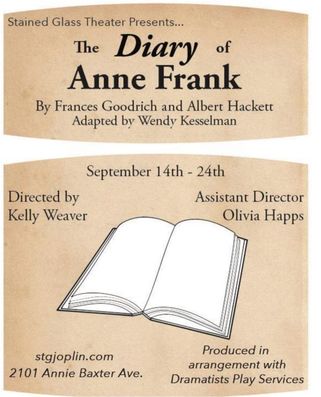 I'm looking forward to this complete production of The Diary of Anne Frank at the Stained Glass Theater - especially since the title character is played by my daughter. The show is based on the true story of the Frank family and others who hid from the Nazis in the "secret annex" behind a warehouse. Anne and the others were sought by the Nazis because of their Jewish beliefs. They lived for two and a half years in the small space before being discovered and taken to concentration camps. There is so much of interest to study in this family, and there is much documentation to pore through. The actual warehouse and annex is available to visit (if you're ever in Amsterdam), but for those of us who are further away from that physical location, the internet brings us much closer. The Anne Frank website is replete with primary documents, first-person accounts, actual photos, video analyses, an amazing interactive timeline, and even an online 3D, walk-through experience that allows the viewer to tour the annex and its surroundings. I could get lost in the website. Emotions run high with the telling of Anne's story. There is the ending, of course (which is decidedly not a happy one), but there is also the loneliness and the cabin fever, the fear and the longing, the hunger and the seclusion. Here are a mother and father who did what they thought best for their family in a time when almost certain death was the only other option. Here are two girls and one boy who never would experience real relationships and families of their own. And here is the father who survived, undoubtedly with feelings that he hadn't done enough - or that he had made the wrong decisions - for his dear family. Playing the 13- to 15-year-old Anne Frank has been an informative experience for my daughter. Reading a copy of Anne's diary and finally getting a glimpse at the movie, she has a great appreciation for the plight of an entire group of people. There area couple of crucial and important lessons for us in the 21st Century here. We're always proud of our girl. She has put a lot of thought into every line of this production, and she does a fine job of playing this intriguing historical figure. Please considering attending one of the showings of The Diary of Anne Frank at the Stained Glass Theatre. More information is on the poster above and on the theatre's website. The last section of Ron Clark's Move Your Bus offers quick conclusive thoughts about each type of person on the education or corporate team. Once again, Clark shares his parable of the bus, adding more personal anecdotes to the mix. As usual, Mr. Clark's reflections offer some wisdom along the way. A couple of those wise portions are recorded below.
When I heard Mr. Clark say this in person, I was freed. For years, I had been told to teach to the middle. Even worse, I had been told to teach to the lowest achievers. No Child Left Behind, remember? But this is not the most productive use of our time and energy! Clark's idea is to teach to the top and pull the others up, rather than push up the top students from below. Thinking about it in that way really puts it into perspective: we understand that it would make very little sense in reverse. Finally, I gave myself permission to return to a previously held belief that I could do just that. I needed to ignore certain "experts" and specialists. In this final section of Move Your Bus, Mr. Clark also reminds readers to have fun along the way. Enjoy the Ride A school without laughter is a school without joy. We know, however, that some laughter is of the nervous type, reflecting not an attitude of joy, but an attitude of anxiety and discomfort. True joy comes when a classroom is comfortable and fun loving. We like to laugh in the middle of lessons. It comes natural to us and it helps us love the class.
Actually we share many emotions as the year goes by. We do laugh, but we also cry, get angry, and get frustrated. In short, we are a family.
You will find important information about appearance, habitats, and behaviors at this BioKIDS webpage.
The class gets pretty excited about our little rock "collection" - 12 specimens of metamorphic, igneous, and sedimentary rocks. What do fourth graders do with their observations? They record them in their composition books. We're just getting started, headed for minerals and more in the coming weeks.
You should check out our class blog. Students enjoy using the Seesaw app on their iPads to write things for the world to read. They are encouraged to record their thoughts, stories, and processes, each day, in a short few minutes. Some take to the blog with more ease than others, but I think the things they've published so far are actually some pretty good thoughts. You are invited to click on over to The Bloggatteer Experience for a look-see. Throughout the year, students will learn how to better navigate the blog. Hopefully, they will learn how to draw, photograph, annotate, and record video entries for the blog, as well.
|
AnthemThe Hoggatteer Revolution
is an extensive, award-winning, inimitable, digital platform for Encouraging and Developing the Arts, Sciences, and honest Christianity in the beautiful, friendly LAND OF THE FREE AND THE HOME OF THE BRAVE This site is described as
"a fantastic site... chockablock full of interesting ideas, hilarious anecdotes, and useful resources." 
...to like, bookmark, pin,
tweet, and share about the site... and check in regularly for new material, posted often before DAWN'S EARLY LIGHT! History in ResidenceElementary Schools: Bring Mr. Hoggatt into your classroom for a week of engaging and rigorous history programming with your students. LEARN MORE BUILDING BETTER
|


